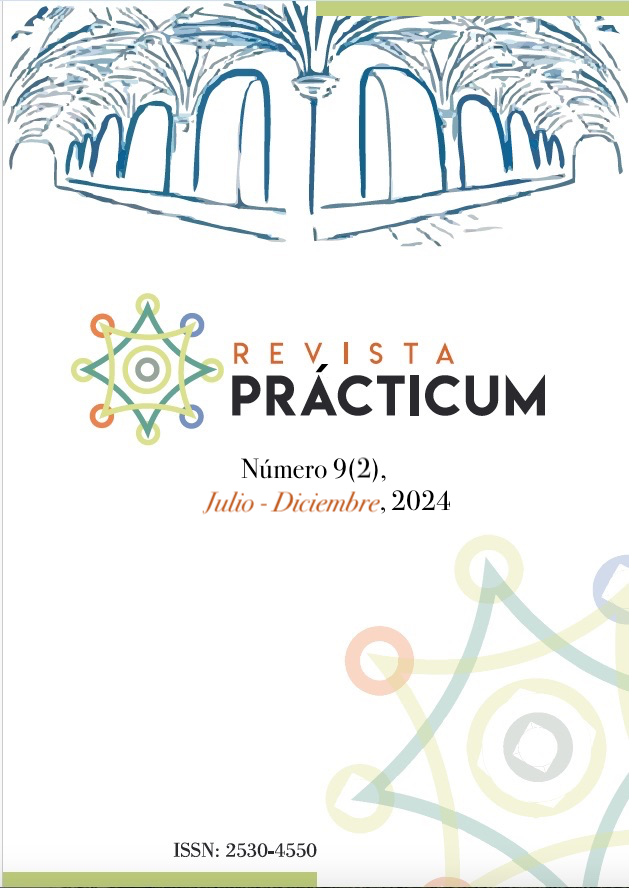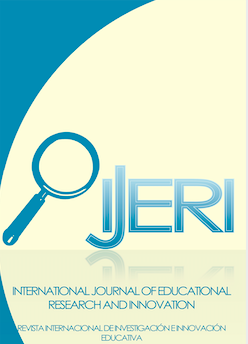A qualitative study of students' cooperative and collaborative relationships during the internship period
DOI:
https://doi.org/10.24310/rep.9.2.2024.20905Keywords:
collaboration, cooperation, teacher training, professional development, internshipAbstract
Teacher collaboration is a key factor in improving school quality, professionalism and even health. However, these aspects are not sufficiently taken into account. One way to improve this situation is to implement cooperative behaviour from the very beginning, from teacher training at university level. This study shows how, with whom and why students collaborate at the university during their internship semester, considering a project at a German university for a Master's programme in education. The method used was qualitative interviews in which the students also pointed out the benefits and disadvantages of the teaching collaboration and whether they were satisfied with the dimensions they experienced. The results show that although there is a willingness to collaborate, there are many aspects to improve in order to make it really effective.
Downloads
Metrics
References
Aliaga Cruz, R., Ávila Arias, R. N., Acevedo Lemus, V. G., & Céspedes Chauca, M. de J. (2022). Trabajo colaborativo: Un reto en la formación docente. Educación, 28(1), e2533. https://doi.org/10.33539/educacion.2022.v28n1.2533
Arnaiz Sánchez, P., Escarbajal Frutos, A., Alcaraz García, S., & Haro Rodríguez, R. D. (2021). Formación del profesorado para la construcción de aulas abiertas a la inclusión. Revista de educación, 393, 37-63.
Bauer, K.-O. (2008). Lehrerinteraktion und -kooperation. En W. Helsper & J. Böhme (Hrsg.), Handbuch der Schulforschung, 839-856. Wiesbaden: VS.
Böhm-Kasper, O., Bos, W., Körner, S. C. & Weishaupt, H. (2001). Belastung und Beanspruchung von Lehrern und Schülern am Gymnasium. Max-Traeger-Stiftung.
Bondorf, N. (2013). Profession und Kooperation. Eine Verhältnisbestimmung am Beispiel der Lehrerkooperation. Wiesbaden: Springer VS.
Bush, A., & Grotjohann, N. (2020). Collaboration in teacher education: A cross-sectional study on future teachers’ attitudes towards collaboration, their intentions to collaborate and their performance of collaboration. Teaching and Teacher Education, 88, 102968. https://doi.org/10.1016/j.tate.2019.102968
Carrete-Marín, N., Boix Tomàs, R., & Buscà Donet, F. (2024). Analysis of the Contribution of Rural Schools to the Territorial Dimension from the Teachers’ Perspective. Revista de Investigación Educativa, 42(2), 311-329. https://doi.org/10.6018/rie.559011
Drossel, K., Eickelmann, B., van Ophuysen, S., & Bos, W. (2019). Why teachers cooperate: An expectancy-value model of teacher cooperation. European Journal of Psychology of Education, 34, 187-208.
Gräsel, C., Fußangel, K. & Pröbstel, C. (2006). Lehrkräfte zur Kooperation anregen. Eine Aufgabe für Sisyphos? Zeitschrift für Pädagogik, 52(2), 205-219.
Gräsel, C. & Gruber, H. (2000). Kooperatives Lernen in der Schule. Theoretische Ansätze - Empirische Befunde - Desiderate für die Lehramtsausbildung. En N. Seibert (Hrsg.), Unterrichtsmethoden kontrovers. Bad Heilbrunn: Klinkhardt.
Imbernon, F. (2024). Tendencias y retos internacionales en la formación permanente del profesorado para la innovación educativa. RECIE. Revista Caribeña De Investigación Educativa, 8(1), 215–229. https://doi.org/10.32541/recie.2024.v8i1.pp215-229
Krečič, M. J., & Grmek, M. I. (2008). Cooperative learning and team culture in schools: Conditions for teachers’ professional development. Teaching and teacher Education, 24(1), 59-68.
Kuper, H. & Kapelle, N. (2012). Lehrerkooperation aus organisationssoziologischer Sicht. En E. Baum, T.-S. Idel & H. Ullrich (Hrsg.), Kollegialität und Kooperation in der Schule. Theoretische Konzepte und empirische Befunde (SpringerLink Bücher, S. 41-51). Wiesbaden: Springer.
Moriche, M. P. R., González, M. V., Pareja, D. G., & Gómez, J. P. (2022). Mejora de los programas de formación inicial docente a partir de la trayectoria personal, académica y profesional del alumnado. Revista Electrónica Interuniversitaria de Formación del Profesorado, 25(2), 1-14. https://doi.org/10.6018/reifop.512851
Nittel, D. (2004). Die 'Veralltäglichung' pädagogischen Wissens. Im Horizont von Profession, Professionalisierung und Professionalität. Zeitschrift für Pädagogik, 40, 342-357.
OCDE (Hrsg.). (2005). Teachers matters. Attracting, Developing and Retaining Effective Teachers.
Peters, R. (2004). Erwachsenenbildungs-Professionalität. Ansprüche und Realitäten. Theorie und Praxis der Erwachsenenbildung. Available online under http://www.die-bonn.de/doks/peters0401.pdf
Pröbstel, C. & Soltau, A. (2012). Wieso Lehrkräfte (nicht) kooperieren - Die Bedeutung "personaler Faktoren" in der Zusammenarbeit am Arbeitsplatz Schule. En E. Baum, T.-S. Idel & H. Ullrich (Hrsg.), Kollegialität und Kooperation in der Schule. Theoretische Konzepte und empirische Befunde, 55-76. Wiesbaden: VS.
Reh, S. (2008). "Reflexivität der Organisation und Bekenntnis. Perspektiven der Lehrerkooperation. In: W. Helsper & R. Tippelt (Hrsg.), Pädagogische Professionalität in Organisationen. Neue Verhältnisbestimmungen am Beispiel der Schule (163-183). Wiesbaden: VS.
Richter, D. & Pant, H. A. (2016). Lehrerkooperation in Deutschland. Eine Studie zu kooperativen Arbeitsbeziehungen bei Lehrkräften der Sekundarstufe I. Gütersloh: Bertelsmann Stiftung.
Rothland, M. (2012). Lehrerbildung und Lehrerkooperation. Programmatik, Ausbildungsrealität und Befunde zu den Voraussetzungen von Lehramtsstudierenden für die kollegiale Zusammenarbeit im Beruf. En E. Baum, T.-S. Idel & H. Ullrich (Hrsg.), Kollegialität und
Kooperation in der Schule. Theoretische Konzepte und empirische Befunde, 191-204. Wiesbaden: VS.
Schaarschmidt, U. (2005). Gesundheit im Lehrerberuf - Analyse eines veränderungsbedürftigen Zustandes. Weinheim: Beltz Verlag.
Schicke, H. (2011). Organisationsgebundene pädagogische Professionalität. Initiierter Wandel - theoretisches Konstrukt - narrative Methodologie - Interpretation (Erziehungswissenschaften). Zugl: Berlín, Humboldt-Univ., Diss., 2010. Opladen u.a.: Budrich UniPress.
Schüssler, R., Schwier, V., Klewin, G., Schicht, S. Schöning, A. & Weyland, U. (Hrsg.). (2014). Das Praxissemester im Lehramtsstudium. Forschen, Unterrichten, Reflektieren. Bad Heilbrunn: Klinkhardt.
Spieß, E. (2004). Kooperation und Konflikt. En Organisationspsychologie - Gruppe und Organisation, 193-250. Göttingen: Hogrefe.
Steinert, B., Klieme, E., Maag Merki, K., Döbrich, P., Halbheer, U. & Kunz, A. (2006). Lehrerkooperation in der Schule: Konzeption, Erfassung, Ergebnisse. Zeitschrift für Pädagogik, 52, 185-204.
Terhart, E. (2002). Standards für die Lehrerbildung. Eine Expertise für die Kultusministerkonferenz. Münster: University of Münster.
Terhart, E. & Klieme, E. (2006). Kooperation im Lehrerberuf. Forschungsproblem und Gestaltungsaufgabe. Zeitschrift für Pädagogik, 52, 163-166.
Werner, S. (2012). Wie kommt Kooperation in die Schule? Zum Spannungsverhältnis zwischen Interventionsidee und schulpraktischer Umsetzung. En E. Baum, T.-S. Idel & H. Ullrich (Hrsg.), Kollegialität und Kooperation in der Schule. Theoretische Konzepte und empirische Befunde, 135-148. Wiesbaden.

Downloads
Published
How to Cite
Issue
Section
License
Copyright (c) 2024 Annika Bush, Núria Carrete-Marín (Autor/a)

This work is licensed under a Creative Commons Attribution-NonCommercial-ShareAlike 4.0 International License.
Acceptance of the work implies that the author grants Revista Prácticum the exclusive rights to reproduce, distribute and sell his or her work worldwide, both in digital and paper formats, CD-ROM, etc.
Likewise, the authors shall grant Revista Prácticum the rights of dissemination, public communication on the Internet and IT networks, data buses, as well as any other portals or electronic devices for online consultation of its contents and extracts, under the conditions of the portal, repositories or databases where the work is stored.
Revista Prácticum allows authors to publish and disseminate their articles and works on their personal websites, research teams, institutional repositories and scientific databases. All this in accordance with the Creative Commons 4.0 License








8.png)








